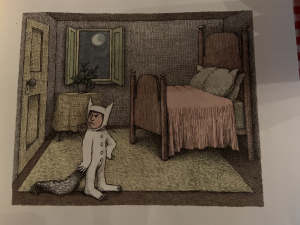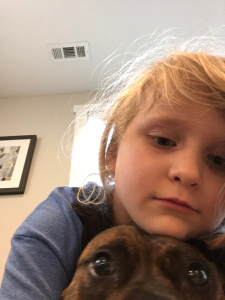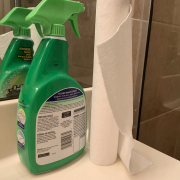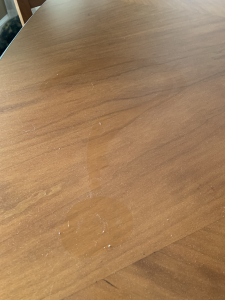When I was a child my family would travel
Down to Western Kentucky where my parents were born
And there’s a backwards old town that’s often remembered
So many times that my memories are worn.
And Daddy won’t you take me back to Muhlenberg County
Down by the Green River where Paradise lay
Well, I’m sorry my son, but you’re too late in asking
Mister Peabody’s coal train has hauled it away…
Then the coal company came with the world’s largest shovel
And they tortured the timber and stripped all the land
Well, they dug for their coal till the land was forsaken
Then they wrote it all down as the progress of man. from John Prine (self-titled), 1971
The first time I saw John Prine in concert, it was hard to know what to make of him. As a college student at the University of Kentucky in the late 1970s, a music fan since childhood, I was already a veteran of many concerts, spanning rock to folk to R&B to jazz to church music. But who had ever seen anything like this guy? In the student center auditorium on UK’s campus, I sat cross-legged on the floor with the rest of the crowd (for a $6 student ticket, they didn’t budget for chairs), watching and listening this odd fellow playing solo with a raspy, nasal vocal, a lone guitar and irresistible energy. He boomeranged around the stage area like a kid on a pogo stick. Can this guy even sing, I remember wondering, before realizing fairly quickly that with John, that question was wide of the point.
The draw for me that night was John’s seminal song Paradise, released five or so years earlier on his self-titled debut album but gaining increasing recognition in tandem with a pressing issue of the times. In those early days of the environmental movement, opposition to strip-mining was gaining momentum. The methods had been used in the region to harvest its rich coal veins beginning in the early post-war years, with catastrophic results to the terrain left behind. Paradise became a theme song for the opposition movement, which was very active on campus in those days, and nearly everyone in that room could sing along with that chorus. The lyrics to Paradise totaled all I knew about John when I scraped together the price of the ticket and showed up that first time, beginning a relationship that lasted until John left us last April, an early victim of the coronavirus pandemic.
John’s family left Kentucky in search of work before he was born, but Paradise remains an indelible symbol of his ties to the state that was home to his parents and the center of so many childhood memories. Interestingly, I heard John say more than once that he never meant it as a political statement or cause anthem. Yet the last time I saw John perform at Nashville’s historic Ryman Auditorium, in the fall of 2018, Paradise provided the groundswell conclusion that has become a closing hallmark of so many Ryman events headlined by legends. All the artists who had joined John on stage earlier in the evening, and maybe even a few who just showed up for the end, gathered around a handful of mikes for Paradise, taking turns stepping to the primary mike for solos of the individual verses. Of course, the audience joined in as the anthem swelled in near operatic fashion to the evening’s end.
But back to that boomerang-action thing for a second, all those years ago: Was he drunk, or high, or some combination of the two? It sure seemed like it at the time, but nearly half a century later, I wonder. In countless venues across those decades, I watched John onstage, his energy growing as the evening progressed. More and more as the years went on, he bestowed such love on the crowd, and the crowd gave it back, a cycle that built and built until he might end the evening by literally dancing off the stage, the picture of a natural high if ever there was one. As we followed him on his 50-year journey as the acoustic everyman, the poetic chronicler of the commonplace and the tragic, the just and unjust, the jocular storyteller at the dinner table we all joined—in our hearts, of course—I wondered if that high, those dance steps, sprang as much from love as any stimulant. If substances contributed, they couldn’t take the place of that which poured directly from the heart.
Dear Abby, dear Abby
My fountain pen leaks
My wife hollers at me and my kids are all freaks
Every side I get up on is the wrong side of bed
If it weren’t so expensive I’d wish I were dead
Signed, Unhappy
Unhappy, unhappy
You have no complaint
You are what you are and you ain’t what you ain’t
So listen up buster, and listen up good, stop wishing for bad luck and knockin on wood. from Sweet Revenge, 1973
John’s humor was the B side to the dark heartbreak in his work, never much daylight between the two. But I wonder if history will view his humor with the same respect afforded to his more serious work. I hope so. Funny stories were everywhere: He told them on stage, in interviews, captured them in songs—many pointed squarely at himself. It was my favorite among the long list of things I admired about him.
And there were so many others. John’s generosity and gracious determination to share his spotlight with others was a joy to watch. He often toured with young, up-and-coming artists, singing with those lucky individuals on stage, recommending their work, supporting their progress both personally and professionally. That spirit extended to those who contributed behind the scenes, as well, as illustrated in this story from John’s obituary in the Memphis Commercial-Appeal. Producer Matt Ross-Spang, who worked on the Nashville studio team producing Tree of Forgiveness (John’s last album), described the sessions as “a surreal couple of weeks.”
Ross-Spang recalled that Prine showed up at RCA Studio A every day in a different vintage Cadillac. “Eventually, he gave one to Ross-Spang — a dark red 1993 ragtop El Dorado.”
“So, the man gave me a car, but that was really the smallest gift he gave me,” Ross-Spang said, citing the other “gifts” of “his friendship, his love.”
Over the years we watched and waited hopefully as John overcame a remarkable series of physical challenges, including heart problems and two varieties of cancer. Surgeries permanently changed the angle of his neck and provided more self-deprecating humor in the form of his wisecracks about the changes in his voice. On a recent road trip as I progressed through a long Prine playlist, I was struck anew by the differences in his voice from the early days and the more recent, post-surgery work. Perhaps because I increasingly admire artists who continue creating until the end of life, as my own birthdays whir past, my heart voted overwhelmingly for the voice quality in the more recent songs. The voice had raw nuances hinting of survival, melancholy, grief, longing, and the heartbreaking speed of the passage of time. John, too, admitted he preferred the sound of his voice after he recovered from cancer. Here’s what he told Fresh Air’s Terry Gross in 2018:
“I said if you leave me with something – if I can make a noise, I said, I’ll come out with a voice on the other end, you know? And the surgeon told me my golf swing will improve after surgery. I said I hate golf. So at least they left with a voice to sing. I think it improved my voice, if anything. I always had a hard time listening to my singing before my surgery.”
Sam Stone came home
To his wife and family
After serving in the conflict overseas
And the time that he served
Had shattered all his nerves
And left a little shrapnel in his knees
But the morphine eased the pain
And the grass grew round his brain
And gave him all the confidence he lacked
With a purple heart and a monkey on his back
There’s a hole in daddy’s arm where all the money goes
Jesus Christ died for nothin’ I suppose
Little pitchers have big ears
Don’t stop to count the years
Sweet songs never last too long on broken radios. from John Prine, 1971
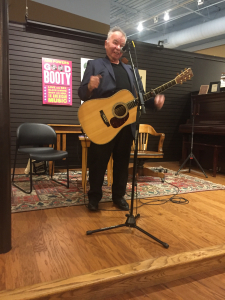 In 2017, John published Beyond Words, a volume of handwritten lyric notes, photographs, and chords to his songs. I nabbed a ticket to a promotional event at our local bookstore, Parnassus, where John agreed to be interviewed on stage and play a few songs, with the proceeds benefitting local charity. Knowing it would be packed, I turned up early and was happy to perch with a decent view, standing, among the bookshelves on the side wall. I had bought my ticket too late to get an assigned seat facing the small stage area.
In 2017, John published Beyond Words, a volume of handwritten lyric notes, photographs, and chords to his songs. I nabbed a ticket to a promotional event at our local bookstore, Parnassus, where John agreed to be interviewed on stage and play a few songs, with the proceeds benefitting local charity. Knowing it would be packed, I turned up early and was happy to perch with a decent view, standing, among the bookshelves on the side wall. I had bought my ticket too late to get an assigned seat facing the small stage area.
In all my years of fandom and concert-going, I had never scored a front-row seat. That night, my luck suddenly changed. When some ticket-buyers failed to show on time, the diligent Parnassus staff began filling the open seats with folks like me from the wings. My heart leaped and continued racing when the manager waved me into a single open chair in the very center of the front row. When our hero stepped to the mic with his guitar a few minutes later, he was barely four feet away. Never a groupie type or celebrity-worshipper for celebrity’s sake, I was astonished at my reaction, working to slow my breathing and keep my face composed.
All that effort worked just fine until he started into Sam Stone, the dark tale of the traumatized Vietnam vet who dies of a drug overdose. In this small, intimate setting, he played and sang it slowly, almost as if he was recalling the story new again, picking out the simple chords on the old guitar in the total silence of the big room. I refused to move or grab a Kleenex when my tears came, so they streamed down unabated, a tribute to him, to the years gone by, to the song and the countless victims who suffered the pain portrayed in it. As he moved comfortably and gently on his feet at the microphone, turning to different parts of the audience, I looked up again, and our eyes suddenly locked. I managed, just barely, to choke back a sob when I saw his eyes fill with tears, as well.
When I get to heaven
I’m gonna shake God’s hand
Thank Him for more blessings than one man can stand
Then I’m gonna get a guitar
And start a rock-n-roll band
Check into a swell hotel
Ain’t the afterlife grand? from Tree of Forgiveness, 2018
I remember exactly where I was when I learned that John had died. Watching for news and praying for days while he breathed through a ventilator in a hospital bed at Vanderbilt Medical Center, part of me thought the indomitable character would surely survive this one, too. In those blinding early days, we were only beginning to understand the horrible impact of this deadly new virus. A dear friend and fellow fan texted a few lines from When I Get to Heaven, and I knew he was gone.
Even after forty-plus years as a fan, the depth of my grief over John’s passing has surprised me. Only recently have I been able to put his songs back into listening rotation. It’s difficult, somehow, to separate it from the broad-based grief over our shared global tragedy; it is nearly impossible to disentangle all the emotions that have raged over this past year. I am among those who believe that John did his very best work at the end of his life, so there has been some small comfort in watching the honors continue to roll in, accolades recognizing brilliant particular work along with a lifetime of achievement.
Of course, I have my extensive collection of his recordings, posters from his concerts, a signed volume of his book—all enduring testimony to the singular nature of John’s body of work and the joy he created that survives him. Still, the loss of his presence remains wide and deep and hurtful. As the world inches back toward open life, there will be no John in Nashville showing up to help out at benefits, no John greeting friends at the local meat-and-three (where, the stories go, vegetables rarely made it into his “three”), no John celebrating New Year’s with his friends on stage and with us, no John telling jokes and encouraging young artists and giving away cars. It feels like losing a beloved uncle whose door was always open, whose porch chairs were populated by the quirky and the downtrodden and the brilliant, in equal numbers, who knew everyone in every chair for their oddities and frailties and fears and loved each of them equally without judgment. Anyone who has a soul like that in their life is richly blessed, indeed. Perhaps John’s greatest legacy is making all of us feel like accepted, beloved friends—even those of us who never actually met him.
In the year since he died, much has been said and written and sung about John’s thoughts on mortality, faith, and the afterlife. Those thoughts began appearing in his work very early in his life, long before tunes appeared like When I Get to Heaven, God Only Knows, a cover of Remember Me, and his final recording, the multiple-award-winning I Remember Everything. All are fine selections if you want to contemplate John’s viewpoint, but my own favorite on this topic is a selection from 1973’s Sweet Revenge. Nearly fifty years before he died, John was already singing about the unpredictable arrival of death and how—with the least amount of reverence imaginable—in death he might still live on through others. Here are the first three verses of Please Don’t Bury Me:
Woke up this morning
Put on my slippers
Walked in the kitchen and died
And oh what a feeling!
When my soul went through the ceiling
And on up into heaven I did ride
When I got there they did say
John, it happened this way
You slipped upon the floor
And hit your head
And all the angels say
Just before you passed away
These were the very last words
That you said
Please don’t bury me
Down in the cold cold ground
No, I’d druther have ’em cut me up
And pass me all around
Throw my brain in a hurricane
And the blind can have my eyes
And the deaf can take both of my ears
If they don’t mind the size
Give my stomach to Milwaukee
If they run out of beer
Put my socks in a cedar box
Just get ’em out of here
Venus de Milo can have my arms
Look out! I’ve got your nose
Sell my heart to the Junkman
And give my love to Rose. from Sweet Revenge, 1973
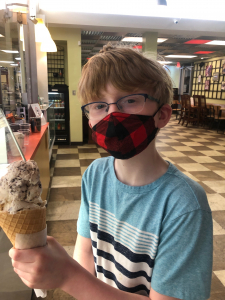 ut comfortably, I encircled his thin shoulders with one arm, then both. Our Buddy is 10 now, tall, angular, thin, elbows and feet everywhere, an openly tender and vulnerable young soul. Inside the safety of my arms, he signed softly for a beat or two, then squeezed back in response.
ut comfortably, I encircled his thin shoulders with one arm, then both. Our Buddy is 10 now, tall, angular, thin, elbows and feet everywhere, an openly tender and vulnerable young soul. Inside the safety of my arms, he signed softly for a beat or two, then squeezed back in response.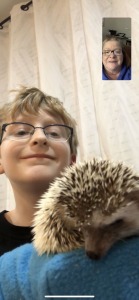

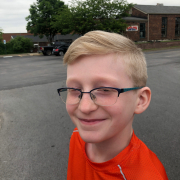
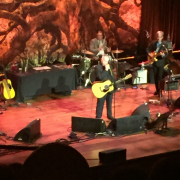
 In 2017, John published Beyond Words, a volume of handwritten lyric notes, photographs, and chords to his songs. I nabbed a ticket to a promotional event at our local bookstore,
In 2017, John published Beyond Words, a volume of handwritten lyric notes, photographs, and chords to his songs. I nabbed a ticket to a promotional event at our local bookstore, 
